Project to support Independent bodies in Tunisia (PAIIT 2019-2022)
General overview and activities
Tunisia and the Venice Commission: long-term co-operation
The Venice Commission strengthened its co-operation with Tunisia after 2011 by supporting with its expertise the process of transition and democratic consolidation on the basis of the Council of Europe main pillars - human rights, Rule of law and democracy. Since 2010, Tunisia has become a full member of the Venice Commission. As such, it associated the Commission in 2012 with the reflections of the National Constituent Assembly on the new Tunisian Constitution which was adopted in January 2014 following an opinion by the Venice Commission.
The growing role of independent institutions in the southern Mediterranean and the situation in Tunisia
Independent bodies are a relatively recent phenomenon in the legal order of Tunisia and in the southern Mediterranean in general. These collective bodies are entrusted, through the Constitution or specific laws, with the supervision of certain sectors of political, social and economic life (for example, in matters of protection and promotion of human rights, prevention of torture, fight against corruption, organisation of elections, personal data protection or media) with the aim of protecting them from political interests and influence, thereby ensuring a high degree of public confidence. Pillars of the democracy strengthening project, five independent constitutional bodies (ICI) were thus established by the Tunisian Constitution of January 2014 (Chapter VI): the Independent High Authority for Elections (ISlE), the Audiovisual Communication Authority (ICA), the Human Rights Authority (IDH), the Authority for Sustainable Development and the Rights of Future Generations (IDDDGF) and the Authority for Good Governance and the Fight against Corruption (IBOGOLUCC ). Other bodies have been created either by organic laws such as the Access to Information Authority (IAI), the National Authority for the Prevention of Torture (INPT), the National Personal Data Protection Authority (INPDP) and the National Authority against human trafficking (INLT), or by decree - framework law such as the National Authority against Corruption (INLUCC)[1] or by decree-law as the Independent High Authority of audiovisual communication (HAICA).
Support the development of independent Tunisian bodies: the PAII-T project
After the adoption of the Tunisian Constitution of 2014, the Venice Commission continued to be very closely involved in the work on the guarantees of independence of the bodies, on common standards for for them through the drafting of an organic law but also on electoral standards, in cooperation with the Independent High Authority for elections (ISIE). This work is based on the tripartite collaboration between the Tunisian independent bodies, the European Union and the Council of Europe, within the framework of the project to support the independent bodies in Tunisia (PAII-T). Initially launched for the period 2019 - 2021, and then extended by 12 months until December 2022, this project is co-funded by the European Union and the Council of Europe and implemented by the Council of Europe. Within the framework of the PAII-T project, the Venice Commission prepared a diagnosis on the current situation and the problems encountered by the authorities. Several practical workshops covering fields as diverse as strategic communication, the budget or the regulatory framework were organised for the authorities and an opinion on the organic law relating to the Authority for Sustainable Development and the Rights of Future Generations was also adopted by the Venice Commission at its 119th session (19-21 June 2019). the Venice Commission also supported the activities of the League of Independent Instances in order to strengthen the synergies between the authorities, to facilitate the resolution of possible conflicts of jurisdiction and to identify common concerns.
ACTIVITIES OF THE VENICE COMMISSION ORGANISED AS PART OF THE PAII-T PROJECT
Urgent opinion on the constitutional and legislative framework concerning the referendum and the elections announced by the President of the Republic
May-June 2022
The Venice Commission published on 27 May 2022 its urgent opinion for Tunisia on the constitutional and legislative framework concerning the referendum and the elections announced by the President of the Republic, and in particular on the Decree-law No. 22 of 21 April 2022, amending and supplementing the Organic Law on the Independent High Authority for Elections (ISIE). The opinion was requested by the European External Action Service, introduced through the Delegation of the European Union in Tunisia and endorsed by the Venice Commission at its 131st plenary session on 17-18 June 2022.
Training of trainers for ISIE members and staff
Tunis, 16-23/03/2022
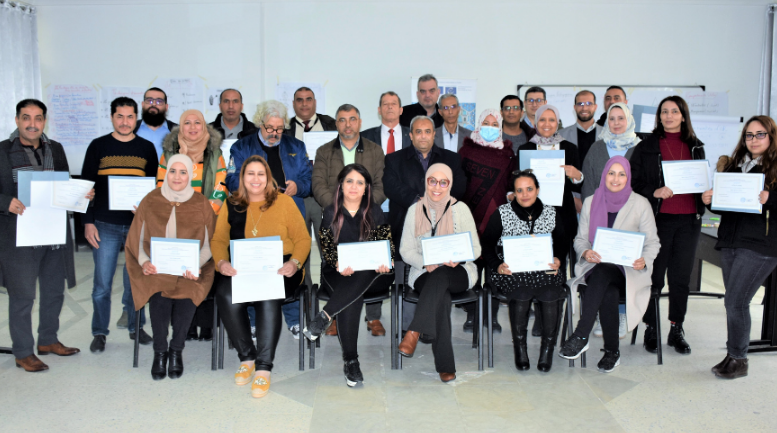 A training course to become trainers for the members and staff of the High Independent Instance for Elections of Tunisia (ISIE) was held from 16 to 23 March 2022. Forty-seven (47) participants from Tunis and the regions attended this event at the National Centre for Training of Trainers and Training Engineering (CENAFFIF), which has extensive expertise in this field and whose training programme has been approved by the ISIE. This activity was organised by the Venice Commission, which supports the ISIE within the framework of the joint programme between the European Union and the Council of Europe "Project to support independent bodies in Tunisia" (PAII-T). These courses will enable future ISIE trainers to master effective teaching techniques and methods to share their knowledge and know-how. Technical training courses on the different professions of the ISIE will be organised at a later stage in cooperation between the Venice Commission and the ISIE.
A training course to become trainers for the members and staff of the High Independent Instance for Elections of Tunisia (ISIE) was held from 16 to 23 March 2022. Forty-seven (47) participants from Tunis and the regions attended this event at the National Centre for Training of Trainers and Training Engineering (CENAFFIF), which has extensive expertise in this field and whose training programme has been approved by the ISIE. This activity was organised by the Venice Commission, which supports the ISIE within the framework of the joint programme between the European Union and the Council of Europe "Project to support independent bodies in Tunisia" (PAII-T). These courses will enable future ISIE trainers to master effective teaching techniques and methods to share their knowledge and know-how. Technical training courses on the different professions of the ISIE will be organised at a later stage in cooperation between the Venice Commission and the ISIE.
Towards strengthening the legal framework for referendums in Tunisia
Tunis, 15/07/2021 (on line)
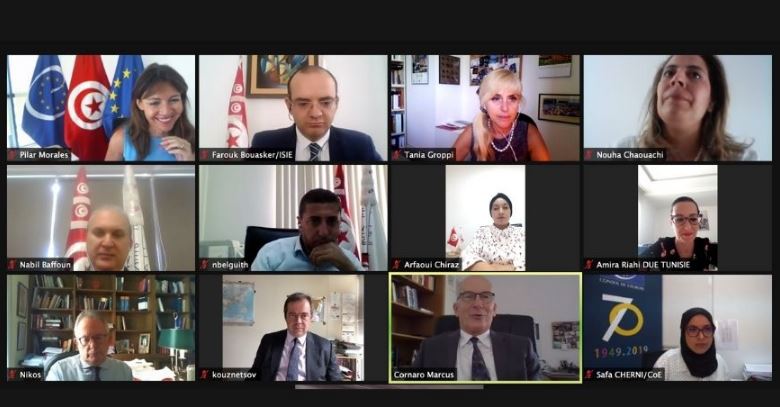 In the framework of the Project to Support Independent Bodies in Tunisia (PAII-T), which is a joint programme between the European Union and the Council of Europe (2019-2021), the Venice Commission and the Higher Independent Electoral Body (ISIE) organised an online workshop on the referendum. In Tunisia, this term refers to a direct vote by the electorate of a state or local authority on a proposed law or on development and regional planning programmes, at the initiative of the President of the Republic or the President of the local authority or one third of the members of its Council, in accordance with the procedures defined by the legal rules in force. This workshop was attended by international and national experts, representatives of the ISIE, the Venice Commission, the Council of Europe and the European Union and other technical and financial partners. It provided an opportunity for reflection on the referendum in order to complete and finalise the legal framework for the referendum in Tunisia, in accordance with international standards, particularly those of the Venice Commission, and good practice in the field, taking account of local specificities. Certain fundamental notions have been clarified, such as, for example, the procedures for drawing up the question submitted to the referendum, the control of the constitutionality of the bill submitted to the referendum, the organisation and observation of the referendum, the effects of the referendum, the existence of a means of appeal and the effects of this appeal (partial or total annulment).
In the framework of the Project to Support Independent Bodies in Tunisia (PAII-T), which is a joint programme between the European Union and the Council of Europe (2019-2021), the Venice Commission and the Higher Independent Electoral Body (ISIE) organised an online workshop on the referendum. In Tunisia, this term refers to a direct vote by the electorate of a state or local authority on a proposed law or on development and regional planning programmes, at the initiative of the President of the Republic or the President of the local authority or one third of the members of its Council, in accordance with the procedures defined by the legal rules in force. This workshop was attended by international and national experts, representatives of the ISIE, the Venice Commission, the Council of Europe and the European Union and other technical and financial partners. It provided an opportunity for reflection on the referendum in order to complete and finalise the legal framework for the referendum in Tunisia, in accordance with international standards, particularly those of the Venice Commission, and good practice in the field, taking account of local specificities. Certain fundamental notions have been clarified, such as, for example, the procedures for drawing up the question submitted to the referendum, the control of the constitutionality of the bill submitted to the referendum, the organisation and observation of the referendum, the effects of the referendum, the existence of a means of appeal and the effects of this appeal (partial or total annulment).
Towards the reinforcement of the legal framework relating to the electoral constituencies in Tunisia
Tunis, 30/03/2021 (on line)
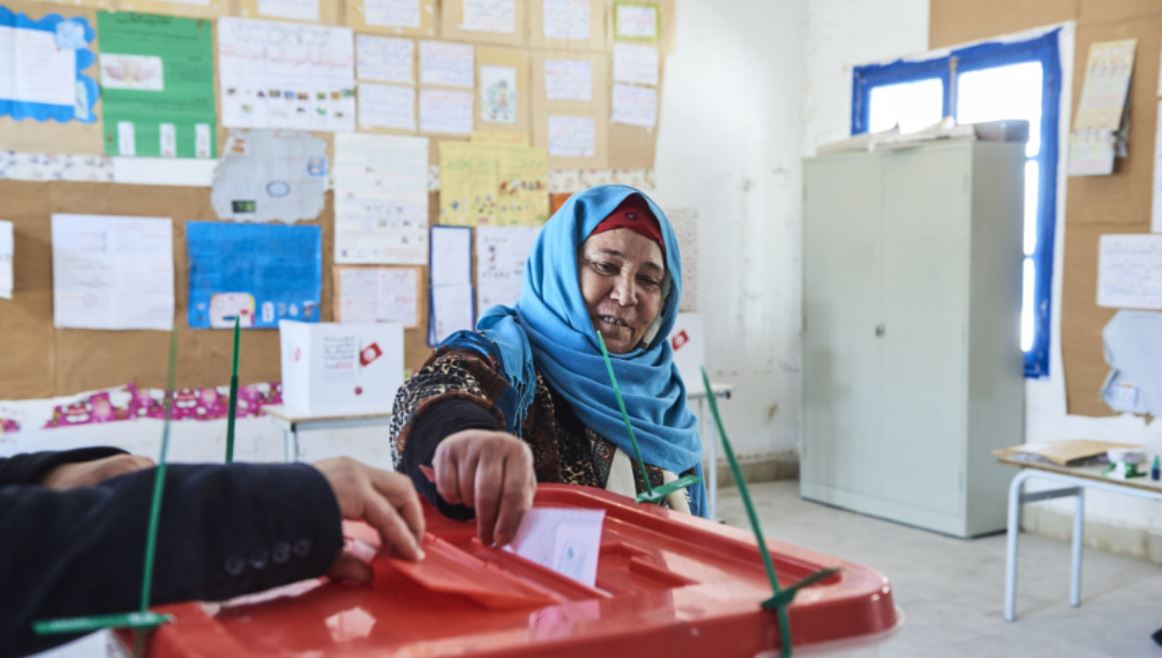 In the framework of the Project to Support Independent Bodies in Tunisia (PAII-T), a joint programme between the European Union and the Council of Europe (2019-2021), the Venice Commission and the Independent Superior Electoral Authority (ISIE) organised an online workshop on the issue of electoral constituencies in Tunisia*. This term refers to the division of a territory into electoral districts, intended to promote the expression of citizens through voting. The division must be reviewed regularly in order to take into account the evolution of the population and to maintain a comparable number of voters per representative in all constituencies. The choice of this theme follows the recommendations of the 2019 electoral observation missions to Tunisia, which suggest, among other things, that the delimitation of electoral districts be updated. This workshop was attended by international and national experts, representatives of the ISIE, the Venice Commission, the Council of Europe and the European Union and other technical and financial partners. It provided an opportunity to reflect on the electoral division and to present international standards and good practices in this area. Some fundamental notions were discussed, such as the principle of equality of electoral strength, which implies a periodic re-evaluation of the number of seats allocated to constituencies with clear and predetermined criteria. The weight of the votes of Tunisians abroad was also discussed. In this context, the experience of the ISIE during the last elections of 2019 was discussed. The body shared the difficulties encountered as well as the challenges raised, with a view to improving the legal framework relating to the electoral constituencies.
In the framework of the Project to Support Independent Bodies in Tunisia (PAII-T), a joint programme between the European Union and the Council of Europe (2019-2021), the Venice Commission and the Independent Superior Electoral Authority (ISIE) organised an online workshop on the issue of electoral constituencies in Tunisia*. This term refers to the division of a territory into electoral districts, intended to promote the expression of citizens through voting. The division must be reviewed regularly in order to take into account the evolution of the population and to maintain a comparable number of voters per representative in all constituencies. The choice of this theme follows the recommendations of the 2019 electoral observation missions to Tunisia, which suggest, among other things, that the delimitation of electoral districts be updated. This workshop was attended by international and national experts, representatives of the ISIE, the Venice Commission, the Council of Europe and the European Union and other technical and financial partners. It provided an opportunity to reflect on the electoral division and to present international standards and good practices in this area. Some fundamental notions were discussed, such as the principle of equality of electoral strength, which implies a periodic re-evaluation of the number of seats allocated to constituencies with clear and predetermined criteria. The weight of the votes of Tunisians abroad was also discussed. In this context, the experience of the ISIE during the last elections of 2019 was discussed. The body shared the difficulties encountered as well as the challenges raised, with a view to improving the legal framework relating to the electoral constituencies.
*Currently in Tunisia, the election of members of the Assembly of People's Representatives (ARP) is carried out from 33 electoral districts. Of the 217 seats to be filled, 199 seats are reserved for the 27 electoral constituencies on the national territory, while the other 18 seats are reserved for the 6 electoral constituencies located abroad.
High level meeting with Tunisian independent bodies
Tunis, 2/12/2020
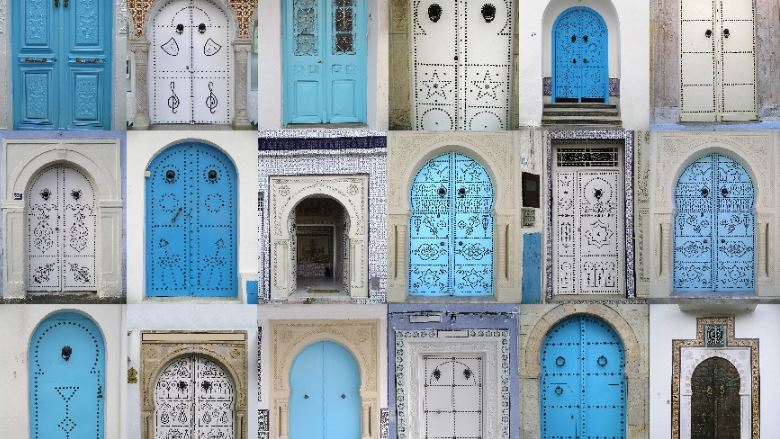 A high-level meeting was held in Tunis on 2 December 2020 between the Minister to the Head of Government in charge of relations with constitutional bodies and civil society, Mrs Thouraya Jeribi, and the presidents of independent bodies. This was an opportunity for the Minister to supervise the resumption of the work of the Steering Committee of the independent bodies, in the presence of the presidents of the latter. In the framework of the joint programme PAIIT, the Venice Commission has been supporting the work of this Committee, which is a coordination structure between the Presidency of the government and the independent bodies, since 2019. Representatives of the Tunis Office team were invited to attend this meeting.
A high-level meeting was held in Tunis on 2 December 2020 between the Minister to the Head of Government in charge of relations with constitutional bodies and civil society, Mrs Thouraya Jeribi, and the presidents of independent bodies. This was an opportunity for the Minister to supervise the resumption of the work of the Steering Committee of the independent bodies, in the presence of the presidents of the latter. In the framework of the joint programme PAIIT, the Venice Commission has been supporting the work of this Committee, which is a coordination structure between the Presidency of the government and the independent bodies, since 2019. Representatives of the Tunis Office team were invited to attend this meeting.
In her opening speech, Mrs Thouraya Jeribi reiterated the importance of the independent bodies within the State institutions and their role in the consolidation of democracy and the human rights system in Tunisia. She then presented a strategic plan of work and action that is based on the following three main axes:
- The establishment of a steering and support system,
- Setting priorities,
- Establishing partnerships.
Several points were also discussed, such as the legislative and regulatory framework of the bodies, their statutes and organisation charts, the election or partial renewal of their members as well as the periodicity of the Steering Committee meetings. The launch of the "Dialogue of independent bodies" with the National School of Administration was also announced. This is a platform for periodic meetings between the chairpersons of the bodies with students and researchers, where the role and the field of competence of the bodies will be presented as well as national developments related to democracy and human rights.
Towards strengthening the legal framework for elections in Tunisia
Tunis, 16/7/2020 (on line)
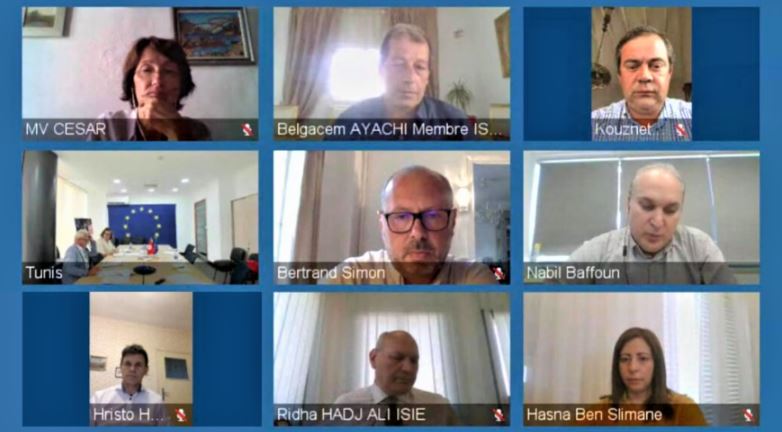 In the framework of the Project to Support Independent Bodies in Tunisia (PAII-T), a joint project between the European Union and the Council of Europe (2019-2021), the Venice Commission and the Independent Superior Electoral Body (ISIE) organised an online workshop on the recommendations of the report of the European Union Election Observation Mission for the 2019 presidential and legislative elections.
In the framework of the Project to Support Independent Bodies in Tunisia (PAII-T), a joint project between the European Union and the Council of Europe (2019-2021), the Venice Commission and the Independent Superior Electoral Body (ISIE) organised an online workshop on the recommendations of the report of the European Union Election Observation Mission for the 2019 presidential and legislative elections.
The workshop, which was attended by international and national experts, representatives of the Venice Commission, the Council of Europe and the European Union, discussed some of the issues raised in the report and will pave the way for reform proposals to improve the existing legal framework.
Follow-up meeting by videoconference with the Independent High Authority for Elections (ISIE)
Tunis, 18/6/2020
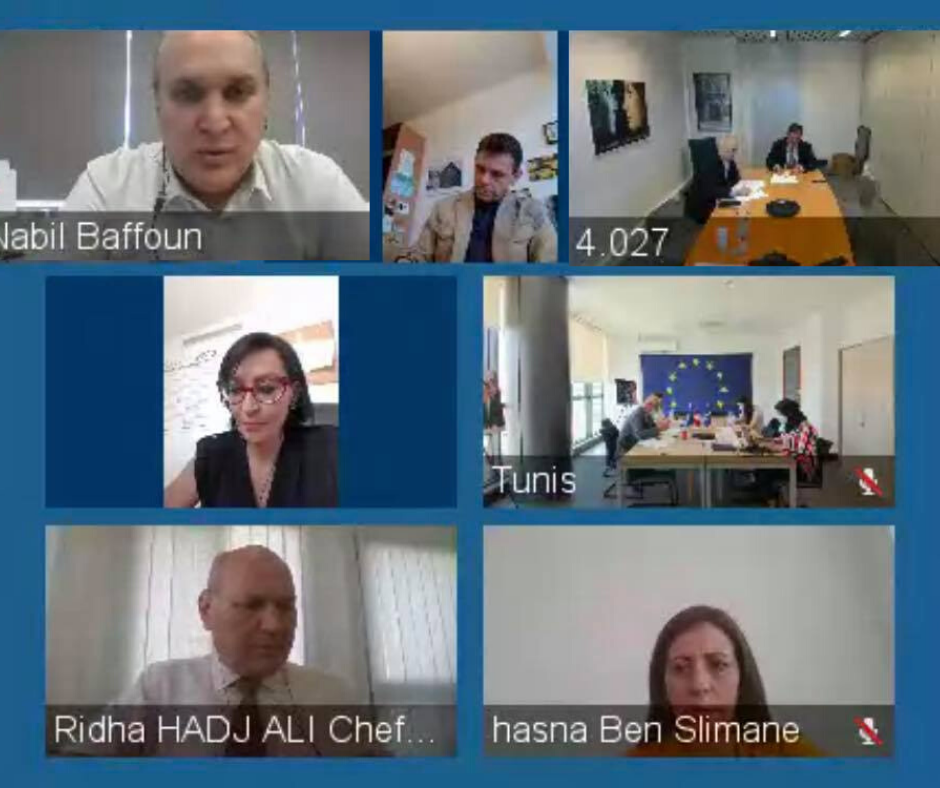 On 18 June 2020, a tripartite meeting between the ISIE, the Delegation of the European Union and the Council of Europe was held by videoconference. This meeting allowed to discuss the state of play regarding the work of ISIE within the framework of the Project to Support the Independent Bodies in Tunisia (PAII-T). After fruitful discussions, the parties agreed on the programming of activities for the coming semester and the other activities to be implemented within the framework of this cooperation. Support for the ISIE is provided within the framework of the “ Project to Support Independent Bodies in Tunisia (PAII-T)”, co-financed by the European Union and the Council of Europe and implemented by this last. The Council of Europe supports and supports the establishment of independent bodies in Tunisia.
On 18 June 2020, a tripartite meeting between the ISIE, the Delegation of the European Union and the Council of Europe was held by videoconference. This meeting allowed to discuss the state of play regarding the work of ISIE within the framework of the Project to Support the Independent Bodies in Tunisia (PAII-T). After fruitful discussions, the parties agreed on the programming of activities for the coming semester and the other activities to be implemented within the framework of this cooperation. Support for the ISIE is provided within the framework of the “ Project to Support Independent Bodies in Tunisia (PAII-T)”, co-financed by the European Union and the Council of Europe and implemented by this last. The Council of Europe supports and supports the establishment of independent bodies in Tunisia.
Legislative and regulatory framework of the independent bodies
Tunis, 4/5/2020
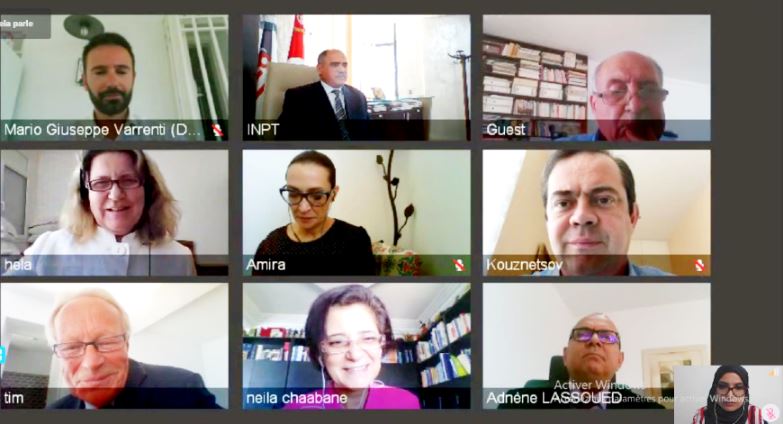 The Venice Commission organised a video conference on 4th May 4 2020 on the theme “Legislative and regulatory framework of Tunisian independent bodies: current situation and challenges”. This meeting made it possible to initiate a reflection on the legislative and regulatory provisions governing the independent bodies. It brought together the presidents of the bodies, Tunisian and European experts as well as representatives of the Council of Europe and the European Union. At the end of the seminar, the participants insisted on the need to:
The Venice Commission organised a video conference on 4th May 4 2020 on the theme “Legislative and regulatory framework of Tunisian independent bodies: current situation and challenges”. This meeting made it possible to initiate a reflection on the legislative and regulatory provisions governing the independent bodies. It brought together the presidents of the bodies, Tunisian and European experts as well as representatives of the Council of Europe and the European Union. At the end of the seminar, the participants insisted on the need to:
1. Make a joint plea on behalf of all independent bodies to the ARP with the support of the Venice Commission, the Council of Europe and the European Union with the aim to:
- Insert laws relating to independent bodies among the priorities of Parliament
- Complete and harmonise the legislative and legal framework relating to instances
- Avoid blockages in the designation and renewal of their members
2. Reiterate the need to provide support to the authorities:
- In the budgetary and financial field
- In the area of administrative management
Budget and financial autonomy of the independent bodies
Tunis, 17/12/2019
This workshop was an opportunity to debate questions relating to financial autonomy and in particular the budgetary question of Tunisian independent bodies, in the light of new texts related to Tunisian independent bodies, such as for example the organic budget law adopted in 2019.The question of establishing and adopting the budget of the authorities, whether constitutional or not, was examined, as well as the nature of the control exercised over them as regards the management of their budget. The recommendations formulated at the end of the workshop aimed to guide Tunisian independent bodies towards the path of accountability and efficiency.
Presentation of the diagnosis report of the Tunisian legislative framework on independent bodies
Tunis, 05/11/2019
This diagnosis report established by independent national experts also made it possible to discuss the state of play and identify the problems encountered by the authorities. The meeting was an opportunity to present the diagnosis report to the representatives of the independent bodies and to debate questions relating to the finalisation of the legal framework of the bodies, their establishment and their functioning. The question of budgetary autonomy was discussed through the prism of the new budget law. Finally, the question of control, whether its nature, its repository or its impact on the authorities, was discussed as the key feature of the independence of the authorities who are at the same time transparent and accountable to the citizens.
The strategic communication of the independent authorities: challenges and opportunities
Tunis, 3/10/2019
The strategic communication of the Tunisian independent bodies plays an essential role in order to enable them to acquire the confidence of their interlocutors, institutional partners and the whole population. The workshop made it possible to discuss ways to improve the visibility of independent bodies and to structure their communication with civil society, other state bodies, public authorities, the private sector and the media. Among the recommendations of the seminar, there is the need to ensure effective coordination between the different bodies in the field of strategic communication.
______________________________________________________
[1] Established in November 2011, the National Anti-Corruption Authority (INLUCC) continues to exercise its missions. However, it will soon be replaced by the new independent body provided for in the 2014 Constitution, the Instance for Good Governance and the Fight against Corruption (IBOGLUCC), created by the organic law adopted on 27 August, 2018 by the Assembly of the Representatives of the People.